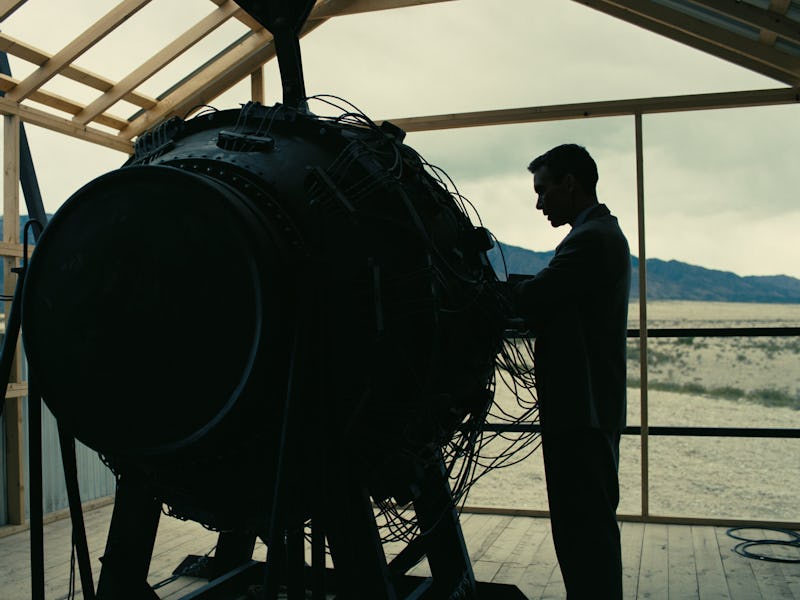Christopher Nolan’s Oscar Winner is Still a Devastating Triumph
Part war epic, part psychological thriller, Oppenheimer is a biopic like no other.

It's a rare, magical thing getting to watch a filmmaker push themselves to increasingly impressive heights. In recent years, moviegoers have gotten to see artists like Greta Gerwig, Damien Chazelle, Wes Anderson, and Jordan Peele all do that over their course of their careers. Of all the directors that have emerged over the past 30 years, though, few have made as much of an impact — or amassed as passionate of a following — as Christopher Nolan.
After climbing up Hollywood's director ladder in the 2000s with his Dark Knight trilogy, Nolan has spent the past 12 years making increasingly interesting, ambitious decisions. Last year, he took his biggest swing to date with Oppenheimer, a three-hour biopic about the father of the atom bomb that doubles as a nuclear race thriller and a psychological drama of apocalyptic proportions. Informally paired by audiences with Gerwig's Barbie, the film went on to become one of the biggest non-franchise Hollywood hits in recent memory and it justifiably earned Nolan some of the best reviews of his entire career.
Earlier this year, Oppenheimer capped off its successful post-release run by winning multiple Oscars, including Best Picture. Now, it's available to stream on Amazon Prime Video.
Cillian Murphy leads Nolan’s latest film as its titular figure, J. Robert Oppenheimer. The movie follows him as he rises from a young student plagued by visions of atoms splitting, to become not only one of the world's most revered theoretical physicists, but also the scientist in charge of the United States' efforts to create a nuclear bomb during World War II. Oppenheimer, additionally, focuses on the post-WWII fallout of its protagonist’s participation in the creation of the world's first weapon of mass destruction.
By depicting both sides of Oppenheimer's story, Nolan's film is able to capture the thrill of scientific discovery as well as the moral cost of putting your own ambition ahead of the greater good. Rarely has a film ever explored an emotion as complex and wrenching as guilt as viscerally and on as big of a scale as Oppenheimer does. The quiet heartbreak of Murphy's confident lead performance is magnified by Hoyte van Hoytema's cinematography, which uses 65mm film stock to fill the movie with stunning full-screen vistas and close-ups of unquantifiable power, and Jennifer Lame's operatic editing, which uses experimental, jarring cuts and moments of visual and aural distortion to reveal the true, disorienting weight of Oppenheimer's many regrets.
The film is, notably, based on a biography by Kai Bird and Martin J. Sherwin titled American Prometheus, which is itself a reference to the Greek titan whose myth revolves around him bringing fire — and, therefore, the means and knowledge to create an actual civilization — to humanity. For this act, it's said that Prometheus was punished by Zeus, who chained him to a rock and forced him to live in eternal agony as an eagle pecks at his liver every day. It's a myth of such colossal metaphorical size that comparing any human being in modern history to Prometheus might seem, at first, like pure hyperbole. In Oppenheimer, however, Nolan delivers a portrait of his historical subject's life that is so overwhelming in its tragedy and horror that its opening allusions to Greek mythology ultimately seem more than justified.
In Oppenheimer, the father of the atom bomb fails to defend his actions — to both the world and himself.
Even those who weren't quite as bowled over by Oppenheimer last year seem to agree that it is, at the very least, a work of considerable power, scope, and vision. It's a three-hour epic about one of the most important turning points in history that somehow feels as big and expansive as it should, and yet firmly grounded in the perspectives and stories of the humans involved. In case that wasn't enough, Nolan also manages to end Oppenheimer with a final montage that functions as both an exclamation mark and an ellipses. Its closing sequence is as bracingly explosive as it is unshakably haunting — and it cements Oppenheimer's place as one of the most excruciating and searing psychological thrillers of this century.
If you still haven't seen it, now is as good a time as any to finally check it out. If you have, then you may be surprised to discover just how well Oppenheimer holds up under the heightened scrutiny of multiple rewatches. It's a blockbuster that already seems destined to withstand the test of time.